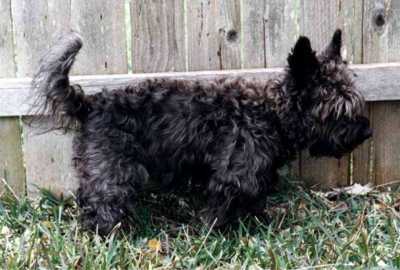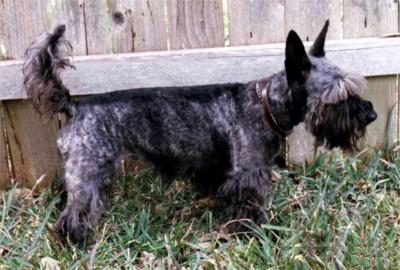
Frisky before
From the time I was given, at age 10, my first dog, I was aware that I needed to groom my pet properly. The fact that we had miniature schnauzers, which definitely require extensive grooming, meant that I had to learn to cut my dog's hair. While it wasn't high on my list of favorite activities, I never minded spending the time on that particular duty. There was a certain fascination with using the electric clippers, along with their various attachments, to achieve the varied lengths of fur, from short on the head to longer on the back. I quickly discovered that the dog's anatomy dictated most of the procedure. The clippers were most effective when used inversely against the natural direction of the hair growth, and I could follow the different colors of gray, black and white in determining where to cut or not. Parts of the schnauzer were left unclipped but later needed to be shaped with scissors, to achieve an even blend from short to long hair.

Because we always had two dogs, we frequently trimmed them both at the same time, so there was a rather festive atmosphere as we set up "shop" in our carport, using an outdoor metal table to place the dog at a convenient height for our administrations. Our dogs were well behaved and knew the routine, so they never struggled or fussed. For the final trim with scissors, it was not unusual for me to sit on the concrete floor and hold the dog in my lap, turning her this way and that to get the right angle.
After a hiatus from dog ownership while I attended college, Larry and I bought Frisky, a Scottish terrier/miniature schnauzer mix, from the pound. I no longer owned electric clippers, but here was a dog that would need regular haircuts. From the time she was a puppy, I trimmed Frisky's fur with scissors. With no set model to follow (Frisky didn't really look just like a schnauzer or a Scottie), I could be more creative with her grooming. It was a little like sculpting: cut off all the hair that didn't seem to look right on the dog. Scissor-trimming takes longer than using electric clippers, but Frisky and I enjoyed our sessions on the back porch. She often fell asleep while I'd do one side, waking only when I needed to flip her over.

Our current dog, Periwinkle, is another wire-haired terrier and in constant need of grooming. Although I'd never trimmed a fox terrier before, it turned out to be rather intuitive, and our pooch usually looks true to her breed. Peri's hair grows faster than any dog I've known, and her thick double coat acts like insulation so that even an extra 1/2 inch of growth can be a burden during hot weather. Needless to say, I cut her hair more often for her comfort than for appearance. Just as with my other dogs, Peri seems to enjoy the scissoring process and is exceptionally cooperative for a rambunctious young dog.
While cutting a dog's hair is not for everyone, it can certainly be a pleasant mutual experience. Dogs are social animals and come to view their haircuts as a routine grooming ritual. Nothing looks quite so happy as a freshly shorn dog frolicking around the yard because she feels cooler after losing that extra layer of unwanted fur.